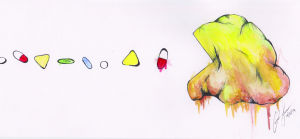Prescription drug abuse growing trend among students
April 30, 2014
Finals week is approaching quickly, and with it come the typical concerns of any college student. The week that can make or break a semester’s GPA certainly carries with it a heavy burden. Often, students will pull all-night sessions, consume inhuman amounts of caffeine and embrace “the Walking Dead.” However, the growing trend of the abuse of prescription drugs is becoming more and more prevalent on campuses nationwide, sparking a debate on the use of drugs, such as Adderall, during the stressful time of finals.
Substance Abuse and Mental Health Services Administration released a study in 2009 that estimated that 1 in 4 college students have used prescription drugs illegally and countless others have been offered them at one point or another during their educational career. It is a hard issue to monitor, because, unlike alcohol that has visible side effects, prescription drugs fly under the radar of traceable usage from an outside observer.
However, when asked anonymously through an online survey conducted by the Washburn Review, 10 out of 10 Washburn students were generally against the use of illegal prescription drugs to help with alertness during finals week. Students surveyed also did not generally participate in the common held practice of pulling all-night study sessions, either.
Certain drugs are more popular than others during finals week. Adderall, a drug typically used to medicate ADHD, is one of the most commonly abused substances. However, harmless it is suspected to be there is a reason that one cannot get the medication without a prescription. Side effects of taking the drug range from minor issues, such as nausea, stomach pains, headaches, loss of appetite, and uncontrollable weight loss. If one has an allergic reaction to the drug, or becomes a regular and dependent user, side effects can increase to more serious issues, such as heart conditions, verbal tics, seizures, unusual fatigue, paranoia, aggression and change or loss in vision.
According to a 2013 Google search statistic, the search combinations of the words “Adderall” and “studying” flat line during non-finals times of the year. Yet when finals week rolls around, the search combination skyrockets.
A national survey on drug use in 2009 estimated that full-time college students were twice as likely to have used Adderall non-medically as those with ADHD who were not full-time students. The same survey estimated as many as 30 percent of students use stimulants non-medically. Sixty two percent of college students with ADHD report selling or giving away their prescription drugs that year.
“Adderall is a controlled substance that is approved by the FDA to treat Attention Deficit Hyperactive Disorder and narcolepsy,” said Dr. Shirley Dinkel, director of Student Health Services and associate professor at the Washburn School of Nursing. “As with all medications, it has side effects. In fact, it has a “Black Box” warning for high abuse potential, serious heart effects including high blood pressure and even sudden death. Other serious effects include depression, psychosis, heart attack, stroke and seizures.”
Illegal use of prescription drugs is not a subject one can laugh off as part of college life. According to the Washburn University Student Handbook, “Students who are found to be in violation of the university’s policies on the use of alcohol and other drugs may be subject to disciplinary sanctions.” According to the manual, these sanctions can result in suspension from Washburn, expulsion or if the student is under 21 notification of parents.
“Success can be accomplished with adequate sleep, healthful nutrition, exercise, lots of laughter and a few good friends,” said Dr. Dinkel. “I do understand the desire to take a drug to stay awake to study harder. However, I am not supportive of taking Adderall to accomplish this. Again, I would ask you – Do you want to be around someone, say a healthcare provider, who is artificially ‘alert,’ who in reality is sleep deprived?”
Counselors provide initial assessment and referral resources if needed and a post-alcohol treatment (if done) update/follow up. Counseling Services will also provide similar assistance to Washburn faculty and staff. Student Health Services can be reached at 785-670-1470. Personnel are prepared to provide initial evaluation, referral and emergency medical support.



